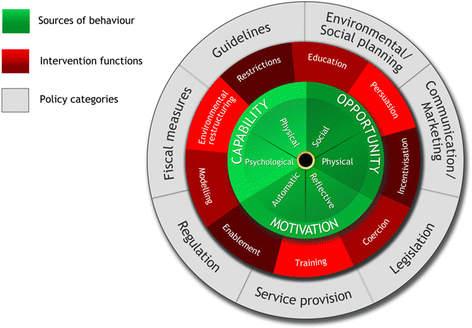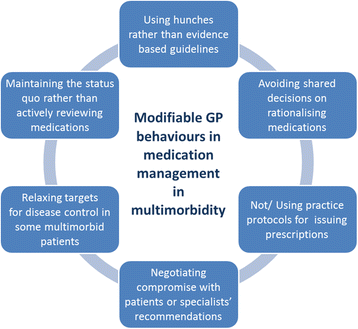Improving medication management in multimorbidity: development of the MultimorbiditY COllaborative Medication Review And DEcision Making (MY COMRADE) intervention using the Behaviour Change Wheel - PubMed (original) (raw)
Improving medication management in multimorbidity: development of the MultimorbiditY COllaborative Medication Review And DEcision Making (MY COMRADE) intervention using the Behaviour Change Wheel
Carol Sinnott et al. Implement Sci. 2015.
Abstract
Background: Multimorbidity, the presence of two or more chronic conditions, affects over 60 % of patients in primary care. Due to its association with polypharmacy, the development of interventions to optimise medication management in patients with multimorbidity is a priority. The Behaviour Change Wheel is a new approach for applying behavioural theory to intervention development. Here, we describe how we have used results from a review of previous research, original research of our own and the Behaviour Change Wheel to develop an intervention to improve medication management in multimorbidity by general practitioners (GPs), within the overarching UK Medical Research Council guidance on complex interventions.
Methods: Following the steps of the Behaviour Change Wheel, we sought behaviours associated with medication management in multimorbidity by conducting a systematic review and qualitative study with GPs. From the modifiable GP behaviours identified, we selected one and conducted a focused behavioural analysis to explain why GPs were or were not engaging in this behaviour. We used the behavioural analysis to determine the intervention functions, behavioural change techniques and implementation plan most likely to effect behavioural change.
Results: We identified numerous modifiable GP behaviours in the systematic review and qualitative study, from which active medication review (rather than passive maintaining the status quo) was chosen as the target behaviour. Behavioural analysis revealed GPs' capabilities, opportunities and motivations relating to active medication review. We combined the three intervention functions deemed most likely to effect behavioural change (enablement, environmental restructuring and incentivisation) to form the MultimorbiditY COllaborative Medication Review And DEcision Making (MY COMRADE) intervention. MY COMRADE primarily involves the technique of social support: two GPs review the medications prescribed to a complex multimorbid patient together. Four other behavioural change techniques are incorporated: restructuring the social environment, prompts/cues, action planning and self-incentives.
Conclusions: This study is the first to use the Behaviour Change Wheel to develop an intervention targeting multimorbidity and confirms the usability and usefulness of the approach in a complex area of clinical care. The systematic development of the MY COMRADE intervention will facilitate a thorough evaluation of its effectiveness in the next phase of this work.
Figures
Fig. 1
The Behaviour Change Wheel
Fig. 2
Modifiable GP behaviours in medication management in multimorbidity identified in qualitative synthesis [21] and interview study [22]
Similar articles
- Improving medication management for patients with multimorbidity in primary care: a qualitative feasibility study of the MY COMRADE implementation intervention.
Sinnott C, Byrne M, Bradley CP. Sinnott C, et al. Pilot Feasibility Stud. 2017 Mar 20;3:14. doi: 10.1186/s40814-017-0129-8. eCollection 2017. Pilot Feasibility Stud. 2017. PMID: 28331631 Free PMC article. - General practitioner views on the determinants of test ordering: a theory-based qualitative approach to the development of an intervention to improve immunoglobulin requests in primary care.
Cadogan SL, McHugh SM, Bradley CP, Browne JP, Cahill MR. Cadogan SL, et al. Implement Sci. 2016 Jul 19;11(1):102. doi: 10.1186/s13012-016-0465-8. Implement Sci. 2016. PMID: 27435839 Free PMC article. - What to give the patient who has everything? A qualitative study of prescribing for multimorbidity in primary care.
Sinnott C, Hugh SM, Boyce MB, Bradley CP. Sinnott C, et al. Br J Gen Pract. 2015 Mar;65(632):e184-91. doi: 10.3399/bjgp15X684001. Br J Gen Pract. 2015. PMID: 25733440 Free PMC article. - Self-management priority setting and decision-making in adults with multimorbidity: a narrative review of literature.
Bratzke LC, Muehrer RJ, Kehl KA, Lee KS, Ward EC, Kwekkeboom KL. Bratzke LC, et al. Int J Nurs Stud. 2015 Mar;52(3):744-55. doi: 10.1016/j.ijnurstu.2014.10.010. Epub 2014 Oct 28. Int J Nurs Stud. 2015. PMID: 25468131 Free PMC article. Review. - Collaborative goal setting with elderly patients with chronic disease or multimorbidity: a systematic review.
Vermunt NPCA, Harmsen M, Westert GP, Olde Rikkert MGM, Faber MJ. Vermunt NPCA, et al. BMC Geriatr. 2017 Jul 31;17(1):167. doi: 10.1186/s12877-017-0534-0. BMC Geriatr. 2017. PMID: 28760149 Free PMC article. Review.
Cited by
- Can a mock medication-taking learning activity enable pharmacy students to experience the range of barriers and facilitators to medication adherence? An analysis informed by the Theoretical Domains Framework and COM-B model.
Mantzourani E, James DH, Akthar MA, Brown SL, Yemm R, Lehnbom EC, Hanrahan JR, Seage CH. Mantzourani E, et al. Explor Res Clin Soc Pharm. 2023 Dec 8;13:100393. doi: 10.1016/j.rcsop.2023.100393. eCollection 2024 Mar. Explor Res Clin Soc Pharm. 2023. PMID: 38192385 Free PMC article. - Intervention elements to reduce inappropriate prescribing for older adults with multimorbidity receiving outpatient care: a scoping review.
Lee JQ, Ying K, Lun P, Tan KT, Ang W, Munro Y, Ding YY. Lee JQ, et al. BMJ Open. 2020 Aug 20;10(8):e039543. doi: 10.1136/bmjopen-2020-039543. BMJ Open. 2020. PMID: 32819958 Free PMC article. - Utility of Big Data to Explore Medication Adherence in Māori and Non-Māori Community-Dwelling Older Adults with Heart Failure in Aotearoa New Zealand: A Cross-sectional Study.
Hikaka J, Abey-Nesbit R, McIntosh B, Schluter PJ, Nishtala PS, Scrase R, Jamieson HA. Hikaka J, et al. Drugs Aging. 2023 Sep;40(9):847-855. doi: 10.1007/s40266-023-01044-2. Epub 2023 Jun 29. Drugs Aging. 2023. PMID: 37386345 Free PMC article. - Towards implementing exercise into the prostate cancer care pathway: development of a theory and evidence-based intervention to train community-based exercise professionals to support change in patient exercise behaviour (The STAMINA trial).
Reale S, Turner RR, Sutton E, Taylor SJC, Bourke L, Morrissey D, Brown J, Rosario DJ, Steed L. Reale S, et al. BMC Health Serv Res. 2021 Mar 22;21(1):264. doi: 10.1186/s12913-021-06275-w. BMC Health Serv Res. 2021. PMID: 33745448 Free PMC article. Clinical Trial. - Identifying barriers and facilitators to deprescribing benzodiazepines and sedative hypnotics in the hospital setting using the Theoretical Domains Framework and the Capability, Opportunity, Motivation and Behaviour (COM-B) Model: a qualitative study.
Keller MS, Carrascoza-Bolanos J, Breda K, Kim LY, Kennelty KA, Leang DW, Murry LT, Nuckols TK, Schnipper JL, Pevnick JM. Keller MS, et al. BMJ Open. 2023 Feb 22;13(2):e066234. doi: 10.1136/bmjopen-2022-066234. BMJ Open. 2023. PMID: 36813499 Free PMC article.
References
- Bayliss EA, Bonds DE, Boyd CM, Davis MM, Finke B, Fox MH, Glasgow RE, Goodman RA, Heurtin-Roberts S, Lachenmayr S, et al. Understanding the context of health for persons with multiple chronic conditions: moving from what is the matter to what matters. Ann Fam Med. 2014;12:260–269. doi: 10.1370/afm.1643. - DOI - PMC - PubMed
Publication types
MeSH terms
LinkOut - more resources
Full Text Sources
Other Literature Sources
Medical

